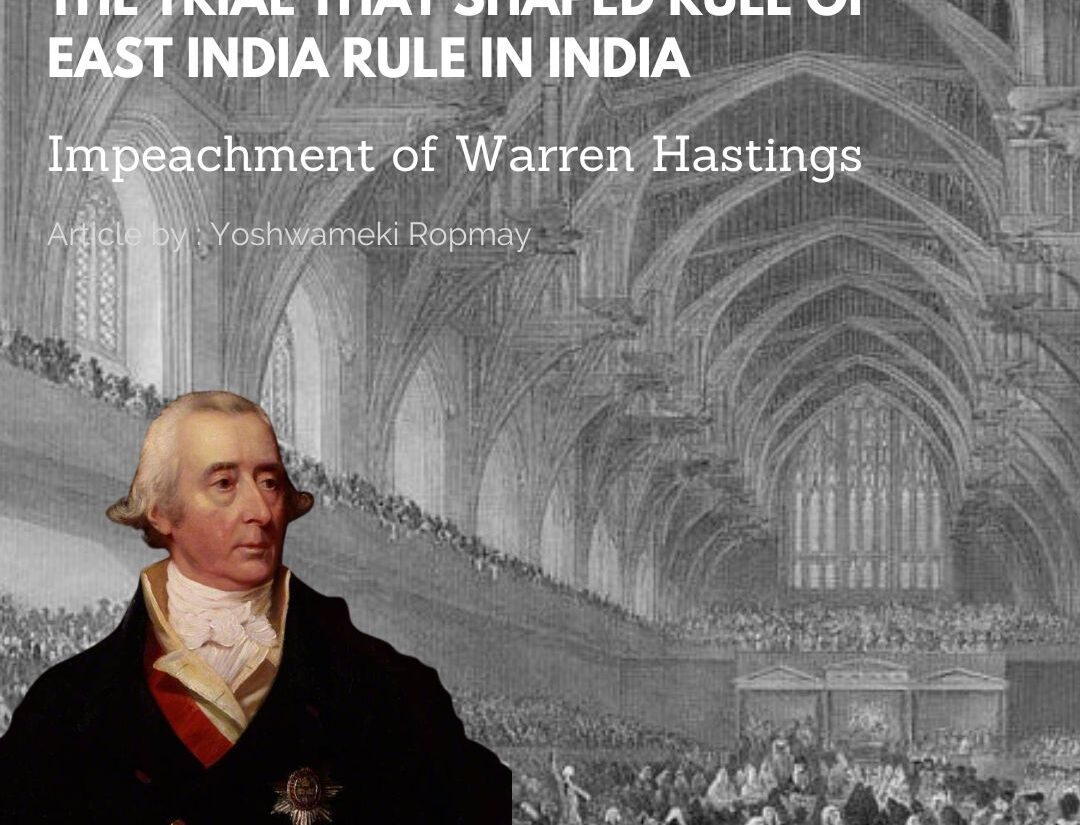The Trial Of Warren Hastings : European Corruption And Illegalities Of Colonial Law
- EIH User
- February 2, 2023

Article by EIH Researcher And Writer
Yoshwameki Ropmay
The trial of Warren Hastings is considered to be the most extraordinary political spectacle in Britain during the second half of the 18th century. Edmund Burke was responsible for the trial of impeachment and to him, Hastings had become a symbol of all that was rotten in the East, both of the impulsive abuse of British power and position and the alarming possibility that the corruption in India would enter Britain through the sanctioned success and fame of Hastings – all the sins of Robert Clive and Paul Benfield who had bought their titles and estates with the ill-gotten gains of the empire being laid at the feet of Hastings. Burke had immersed himself in the East India Company affairs and impressed the court with his deep knowledge of Indian events and Company activities; making the Indian victims of Hastings – from the begums of Awadh to Nand Kumar household names. By painting Hastings as a villain who was to be held responsible for Company policy, Burke sought to put all the iniquities of the British in India on trial. In this article, we will look at how the illegalities of Colonial law started to have a viable impact in the prevalence of European corruption in Indian society through the lens of Edmund Burke and his trial of Warren Hastings. The parameters of British rule started to change with the rule of law established. The principles behind the rule of law started to become a site of confrontation between the ruling European bureaucracy and the educated Indian community; the educated Indians gradually arming themselves with the moral principles that lay behind the rule of law leaving the colonial government to pin its rule onto the dry legal frame.
The air of Bengal during the 1770s was thick with conspiracies; the period seeing a swift rise to prosperity and power of a group of Europeans and the Indians they chose to back – both the Europeans and Indians of different groups with different loyalties and allegiances jockeying for positions of power and advantage. Warren Hasting, the Governor General of Bengal, had on occasions cultivated Indians who were in positions of influence. While money was flowing fast into European and Indian hands, disaster intervened in the shape of the Bengal Famine of 1770. The Court of Directors made enquiries into the activities of a few Indians who continued to collect taxes when the people of Bengal were experiencing famine. The pressure of an outcry in England headed by Edmund Burke and also in India made it impossible to ignore the situation. Burke played a key role in the activities of a select committee that established the Regulating Act of 1773 which was responsible for creating the Supreme Court in Calcutta. It was also the responsibility of the committee to entail a serious examination of the court’s influence which led to the trial and sentencing of Nand Kumar (the person chosen to collect evidence against the Indians responsible for the famine); many assuming Hastings to be responsible behind the judicial murder. Burke examined the documents that portrayed the court as having trampled on Indian customs and traditions while considering European concerns about the racial composition of juries. Although no subject was accused, Burke’s unease about Company politics and his concern to discover more stems from his work with the committee which later reconvened with the mission to examine the relationship between the East India Company and the local inhabitants of India.
Burke spent much of his time looking into the abuses of Company rule in India; moving to recall Hastings but opposed by Company stockholders. Warren Hastings was painted as a symbol of corruption, bribery and misuse of power and authority; Burke undertaking Hastings as a case-study to project a vision of what corruption of European public figures would do to the rule of law that was to be the anchor of British rule in India. He began to work on what became the Fox India Bill but was defeated in the House of Lords because he was unable to rouse any major support. The Pitt bills were passed in 1784 and there was widespread agreement that Hastings should be brought home and replaced by a less controversial figure. Hastings returned to England and was well received by many including the royal court. Burke began the formal assault on Hastings presenting before the court charges beginning with the Rohilla War of 1774 which included the Benares charge in which it was alleged that Hastings had driven Raja Chait Singh to revolt in 1781; Hastings’s confiscation of landed income and treasure of the begums of Awadh; awarding of corrupt and extravagant contracts; illegal receipt of presents from Indians; Hastings’s revenue policy; the conduct of the Maratha War and his treatment of the Rohilla Faizullah Khan.
We will look at two rather important charges which detailed corruption and sexual violence as a major drawback to the established British rule of law. In the Benares charge, Hastings was accused of forcing Raja Chait Singh to make various additional military contributions which was in direct violation of the Company’s settled agreement with the Raja; provoking him into rebellion not only by making other extraordinary demands but also by attempting to arrest him in his own palace. The Benares charge was therefore seen as emblematic of the entire political history of the Company from the 17th century to its demise as a result of the Great Rebellion of 1857-58. Burke also brought in the prevalence of sexual scandal that was reported to him. The use of sexual violence as a means to blame Hastings not just for all he did himself but also for the actions of Devi Singh – the torturer who was said to have virgins delivered to his bed – was especially drawn to the importance of women in the formation of political opinion in late 17th century England. While Burke horrified the audience with his carefully rendered images of the torture of women’s breast, he was setting up his consequent assault on Hastings for the violation of women with respect to the begums of Awadh. India itself was cast as feminine, in a way that dramatized its exoticism and rendered itself as an object of Britain’s protective and patriarchal benevolence; Burke’s rhetoric consistently highlighting the gendered and sexualized character of the imperial scandal.
During the trial of Hastings, Burke was redefining the frontiers of what could be considered corrupt or morally reprehensible; the danger of public corruption lying at the watering down of the principles of the Europeans, something which poisoned the well-spring of the European judiciary at the source and made its misrepresentation with different people and different customs inevitable. The condemnation therefore served a double purpose where on the surface it could be seen as a moral outburst but under it, a delineation of a standard of morality that would hold true for both behaviors, based on the belief that without that foundation, it would be better to vanish without a trace. The prospect of quick fortune created deep vested interests among the British who stood against each other to protect their own corrupt networks – standing in the way of any assertion of principle and duty. Burke was sympathetic to the misfortunes of the incorruptible Englishmen in India but connected the network of interests to the oppressed Indians who had been a subject to the hypocrisy of Company rule. He cited the case of Nand Kumar to hammer home his belief for the need of an Indian Bill to come into operation in India; insisting on viewing the interests of the honest Englishman and honest Indian as the same – a vision of an imperial rule but an imperial rule which functioned on the same set of moral principles and one that would not lead to tyranny and oppression of the weak.
REFERENCES
Dirks, Nicholas B. The Scandal of Empire: India and the Creation of Imperial Britain. Harvard University Press, 2008.
Mukherjee, Mithi. India in the Shadows of Empire: A Legal and Political History (1774-1950). OUP India, 2009.
Mukhopadhyay, Anindita. “Rule of Law.” Foul Play: Chronicles of Corruption, edited by Shiv Visvanathan and Harsh Sethi, Banyan Books, 1998, pp. 291-316.
Rudd, Andrew. Sympathy and India in British Literature, 1770-1830. Palgrave Macmillan London, 2011.

















